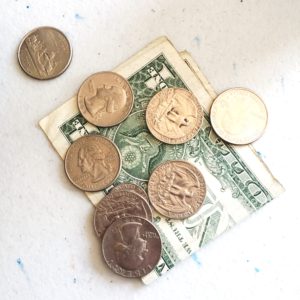My Aspergirl is getting older and I’m finding myself a bit reflective. I think of how she was a spunky kid, how she loved her stuffed animals as much as anything and how she’s forever changed my perspective on life. With that deep introspective comes all sorts of “what could I have done better-s” flooding my mind. I’m sure it’s normal for any parent. If there is one thing our family has strived to do it is to pass on things from our journey in the hope they may make your own journey a little smoother.
Today, that brings me to money. Not how to save it or even whether or not to spend it, but to remind you to be willing to teach the Aspie in your own life how to, literally, pay for things. (And if you are an Aspie, use this as a reminder to speak up and tell a responsible person in your life that you want to learn. That is, if this is something you feel you need to be better at. You may already be an expert at it!) We’re talking what to do when the cashier says what your total is, or when the self-checkout lane is ready to take your payment.
Here are a few things that came to mind when remembering my own daughter’s money handling learning curve. In fact, this doesn’t just apply to Aspies. Many can use these tips for how to learn pay for things whether you use a card, online methods, or cold hard cash.
- Paying in person using a credit or debit card
(Note: this post is not condoning getting anyone their own credit or debit card, but it is good for anyone to understand how to use them.)
Anyone in my country (USA) who uses a credit card has had to relearn how to pay with them in person. Chip reader, anyone? When you think of how to teach someone to successfully use a credit or a debit card at the register, it wouldn’t hurt to think back to how it was once all “new to you,” too. It’s easy to feel pressed when in line to hurry up and finish the transaction. However, being empathetic goes a long way.

Have payment ready, but keep it secured.
Being self-aware is also a good lesson to use here. Aspies, including our Aspergirl, are known for having trouble with their “place in space.” It is helpful to teach them there is an unwritten rule regarding keeping appropriate distance between them and the person in line in front of them (if there is one). Teach them this gives the other customer a bit of privacy, which is a good thing. This also translates into giving them adequate personal space. When it’s their turn to pay, they will need that space, too.
But before it’s their turn at the register, teach your kid to look for cues so they can be ready to pay. This varies from place to place but you get the picture. We’ve all been behind someone who doesn’t even open their purse until well after all the bags are in the cart, then somehow can’t locate their wallet, right? When paying using a debit or a credit card it’s important to let your kid know when to get it ready (this goes for paying in cash, too). It’s likewise important to instruct them once they have the card available to keep it in their pocket (purse, etc.) until it’s time to use it.
Of course, when paying with a debit card, remind your kid to never ever give out the PIN. (If the machine isn’t working, don’t give the cashier the PIN, either.) Sounds like common sense, but if this is new to them, so is the notion of keeping that number a secret.
Another important aspect to teach them is to keep the card number out of sight of prying eyes. This is easily done by covering several numbers, etc. with a few fingers. It’s all too easy these days for a thief to steal credit card information. That being said, there is an exception to this rule. There are legitimate times a cashier might need to key in the numbers, such as when the card reader isn’t working properly. Teach them the difference between the two.
- Purchasing things online
As you know, there are many ways to buy things online using any method from PayPal to credit cards and several others in between. No matter which method you use, teach your Aspie how to understand which sites are safe (look for the lock!), which are “sketch” and which need MomDad to check it out, first.
Let’s refer back to the personal space comment above. Remember when they buy things online with others around they need to make sure they have privacy (personal space) when they “proceed to check out.” It goes without saying to communicate to them to never share passwords with friends or other family, no matter how close they may be. Contrary to what many think, Aspies can be very trusting. (Dude – Aspies are human. They can trust people. They’re not cold hearted bots. Ahem.) This is a good time to pull out social stories, dust them off and write a few one-liners for the situation. In other words, “I’m sorry, that information is private,” is better than “I don’t want you taking my information.” Also encourage them they do not have to elaborate if someone presses them why they won’t give that info up. Do, however, choose to explain to them why this is a rule they must always keep.
- Making purchases in person using cash
Going with the main theme of watching out for prying eyes teach your Asperkid to pay attention when pulling out the wallet. This goes back to the “know my place in space” mentioned earlier. Teach them to try to keep these types of contents guarded from strangers. It is no one’s business what is in someone’s wallet or purse. (And, no, if you can’t locate your wallet in your purse you may not ask a stranger to help you find it…)
Difficulty with motor skills (fine and/or gross) for those on the Autism Spectrum is real for most. When my Aspergirl was younger it took a very long time for her to develop the skill of paying for things in person. Due to this, she had a heckuva time physically pulling out cash then counting it. True story: She started dumping the contents of her wallet on the counter then made a practice of telling the cashier to “take what you need.” Seriously. (And, no, we did not allow that… This was a teaching moment repeated over and over again.)

Paying with Cash Involves Motor Skills
In other words, it can be difficult for some on the Autism Spectrum, with Asperger’s, to physically access cash, count the cash, and hand it to the cashier in a very short amount of time. (Again: motor skills are a thing.) Think about it; there are several steps involved plus potential not so kind comments from customers in line. Now, don’t let the thought of a slow checkout stop you from letting them pay on their own. I mean, we’re parents of Aspies, the super humans! We’ve had stranger-glares, stranger-stares for years. We can handle it. Instead, tuck this info away so that you can pull out patience and kindness from your own mental tool kit the next time you are at the register.
All in all, each family has their own way of using money. That’s not what this is about. What it is about is we’ve gotta give these kids “the Talk” once in a while, and the subject of said Talk will vary. If you haven’t already worked with your kid to physically pay for all manner of things, like plushies, collector cards, or tix to the concert of their dreams it’s not too late to start.
Yeah, I know, you’ll need to talk about budgeting and all that, too. But that talk won’t matter if they can’t figure out how to (literally) pay for the things they need and want.
The next time you work with your Asperkid on money handling, don’t take the easy way and physically complete the transaction yourself. Let them take a turn at it. (Again, talking the act of paying, not who is paying for what.)
Take a moment to pass on these crucial skills to your child. To get pun-ny, it truly will pay off dividends in the long run!
Cheers!
~Julie

